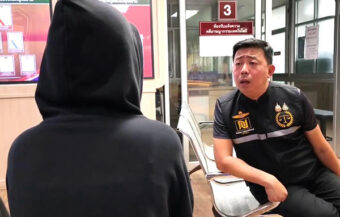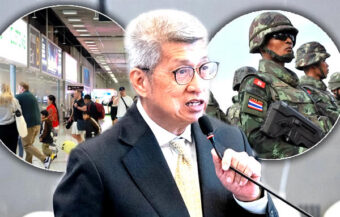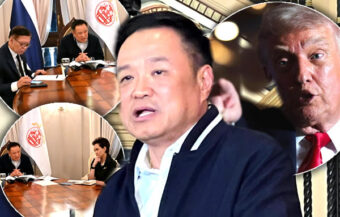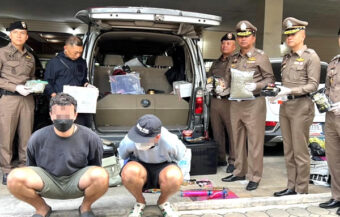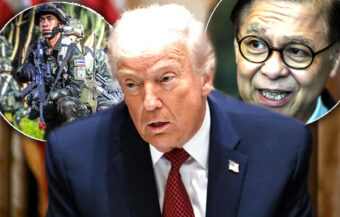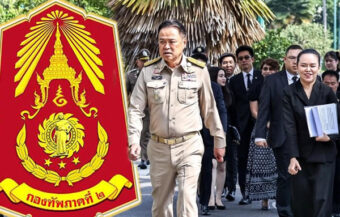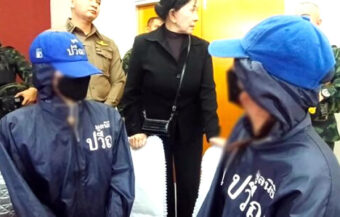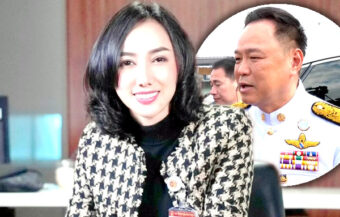The summit is being seen as a chance by the United States to reset its relationship with ASEAN and its member states but the bloc is often used by those states, including Thailand, as a shield for avoiding hard questions about China in the region and accords more with China’s foreign policy which is to achieve hegemony through closer economic and geographic integration.
The forthcoming US ASEAN summit in Washington DC is going ahead after repeated delays and postponements of the meeting long called for US strategists. The summit is already being played down by some ASEAN members but the United States is making no secret that the key issue on the agenda is China and the changing world dynamic that has been ushered in by the war in Ukraine. Following the cancellation of the summit in March by Cambodia as chair of ASEAN, Singapore’s Prime Minister Lee Hsien Loong visited Washington where he warned that the current situation in Asia was moving in a ‘dangerous directions’ and could even lead to some Asian countries embracing a nuclear deterrent.
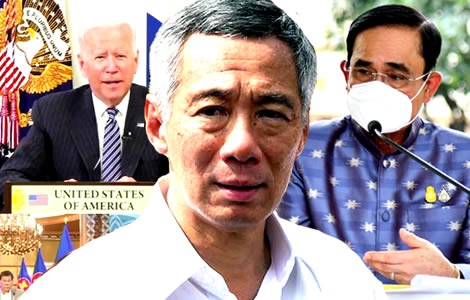
Thai Foreign Minister and Deputy Prime Minister Don Pramudwinai, on Wednesday, confirmed that Prime Minister Prayut Chan ocha will attend the rescheduled May summit between ASEAN leaders and the United States in Washington DC.
On Monday, speaking with reporters, General Prayut revealed that he had not yet been invited to the summit due to be held from May 12th to the 13th next although on Wednesday Mr Don clarified that the visit was based on an earlier invitation which had to be postponed.
US official Dr Kurt Campbell sees a reinvigorated US presence in the Indo Pacific to counter China
General Prayut, on Monday, said that, so far as he was aware, preparations were underway in preparing a proposed agenda for the meeting which has been long sought after by American policymakers, in particular, the National Security Council where the White House coordinator for Asia, Dr Kurt Campbell, is seen as a key architect of an invigorated policy by the Biden administration which envisages a more robust US presence in the Indo Pacific region and efforts to contain the rising influence of China.
This week, White House press secretary, Jen Psaki told the reporters that the purpose of the forthcoming summit would be to ‘demonstrate the United States’ enduring commitment to ASEAN.
She outlined an agenda and US initiatives that significantly did not mention security issues except for a general reference to the rising influence of China.
Ms Psaki talked of stronger ties with ASEAN to advance further cooperation on fighting Covid-19, climate change and furthering economic growth.
Purpose of the summit is to address the rising power of China and a growing potential for instability
However, it has been made clear that the purpose of the talks is to address the rising power of China in the region in an environment that has been changed drastically by the Russian invasion of Ukraine and China’s supportive relationship with President Vladimir Putin after the two countries signed a friendship pact on February 7th, weeks before the invasion commenced on February 24th.
The proposed summit between ASEAN and the Biden administration in Washington DC has already been postponed once because of a reported schedule of conflicts between the leaders of the 10 nation community.
It was originally scheduled to have taken place between March 28th and 29th and there are still open questions as to who will be participating.
Despite the cancellation of the US ASEAN summit at the end of March, one key ASEAN country leader who did make it to Washington DC and the White House was Singapore’s Prime Minister Lee Hsien Loong.
On his visit to Washington, Prime Minister Lee had discussions with Vice President Kamala Harris and met President Biden in the Oval Office.
He also spoke at an event organised by the Council on Foreign Relations, a highly respected non-profit organisation and think tank established in 1921 and based in New York.
He revealed his deep concern over the implications of Russia’s invasion of Ukraine and its after-effects which he signalled will impact Asia.
He said the war would bring about a significant reversal of the global multilateral order and would economically damage countries relying on globalisation to sustain their economies.
Singapore’s premier Lee Hsien Loong warns that some Asian countries may even embrace nuclear deterrents citing polls in Japan and South Korea
He condemned the aggressive use of power by Russia against a smaller nation but also warned of the new dangers the war had unleashed on economic cooperation.
‘If a principle is accepted, that crazy decisions and historical errors are the justification for invading somebody else, I think many of us are going to be feeling very insecure,’ he said. ‘Now, it is win-lose, you want the other guy to be down, fix him, crash his economy. So, how then do most of the countries hang together and cooperate with one another and not fall into disorder, autarky or anarchy?’
He said the war must have an impact on Asian countries who are already impacted by rising tension between China and the United States and who must now be circumspect about their defence.
He pointed to reports of opinion polls in both Japan and South Korea, two countries that have strongly supported the United States in its aggressive response to Russia after the invasion, showing more public acceptance of the prospect of these countries hosting nuclear weapons and installing a nuclear deterrent provided by the United States.
‘The thought is planted and it will not go away because the implication from Ukraine is that nuclear deterrence is something which can be very valuable,’ Prime Minister Lee explained. ‘I think we’re heading into very dangerous directions.’
The crux of the matter is China’s rising power
He said the war in Ukraine and the emerging tensions were changing the status quo in the Indo Pacific region. He described the crux of the matter as being how to deal with a more powerful China.
He questioned how Asian countries were going to respond to make China less ‘overbearing’ and more ‘acceptable to the US, which currently is the dominant military power worldwide.’
‘You need to give thought to this and steer things in a direction which does not lead you to a hot conflict,’ he said.
Myanmar’s military junta government not invited but Cambodia’s strongman since 1985, Hun Sen, will be there as the current Chairman of the ASEAN bloc
The guest list for the White House is still not finalised with the United States suggesting it will invite a ‘non-political’ representative to take Myanmar’s seat at the table.
Myanmar and its military junta government are currently engaged in a bloody military conflict or civil war between the civil society groups, ethnic groups and the recently formed armed forces of the National Unity Government (NUG) of the country representing the democratically elected establishment before the coup d’état on February 1st 2021.
Unity Government claims to be the legitimate authority in Myanmar based on the last election poll before the military quashed democracy
The Biden regime’s decision not to invite the junta is linked with its emphasis on democratic rights and principles as well as the fact that the junta leadership of the country and the military or the Tatmadaw, is currently being sanctioned.
Cambodia’s leader, as the current chair of the ASEAN, cancelled the meeting scheduled for March saying the date was ‘inappropriate’, will, on the other hand, be in attendance.
Rising tensions between the United States and Cambodia as Hun Sen’s army signs a pact with China’s People’s Liberation Army at the end of March
This is despite rising tension between Cambodia and the United States.
Nonetheless, US President Joe Biden reportedly wrote to the Cambodian leader Hun Sen on January 14th last saying he ‘looked forward’ to working with him in furthering ASEAN US relations.
On April 16th, the Cambodian Foreign Ministry described the proposed summit as a celebration of ASEAN US relations over the last 45 years.
‘ASEAN and the US are set to convene a special summit to celebrate four and a half decades of ASEAN-US dialogue relations,’ it announced.
At the end of March, the Cambodian and Chinese armed forces signed a memorandum of understanding with each other which is seen as deepening security ties between Thailand’s eastern neighbour and Beijing.
The deal was signed by General Hun Manet, the deputy commander-in-chief of the Royal Cambodian Army and General Liu Zhenli the chief of China’s People’s Liberation Army Ground Forces.
Pact signed by Hun Sen’s son and follows American sanctions last December over the secret use of a Cambodian naval base in the Gulf of Thailand by China
General Hun Manet, educated at West Point, is the son of Cambodian strongman and Prime Minister since 1985, Hun Sen whose country has grown increasingly hostile to the United States after being placed under an arms embargo by Washington and called out by United States officials in 2019 over sensitive military cooperation with China.
This followed a secret agreement negotiated with Cambodia to allow Chinese armed forces exclusive use and access to Ream Naval Base on the Gulf of Thailand.
In December last, the US Department of Commerce imposed the arms embargo on Hun Sen’s country and made it clear that this was linked to Cambodia’s military cooperation with China which it said undermined and threatened regional security.
Previously, a US Embassy spokesman in Phnom Penh, Chad Roedemeier, warned that the secretive arrangement relating to the naval base was damaging to that kingdom. He said it had implications for ‘regional security and sovereignty.’
‘Full transparency regarding the intent, nature, and scope of these activities would benefit the Cambodian people, neighbouring countries and ASEAN,’ he declared.
The influence of China on Cambodia, Myanmar and Laos is a rising source of concern to the United States.
Privately, there is frustration at ASEAN’s fence-sitting as concerns rise about China’s more belligerent posture and treatment of Uighurs
US officials, privately, also have become somewhat frustrated by the fence-sitting posture of ASEAN countries including Thailand as concern has grown over China’s increasingly belligerent style and its posture in the Indo Pacific including its actions towards Taiwan and recent developments in Hong Kong.
In western countries, there is also a growing moral repugnance and outrage against China’s treatment of its Uyghur population in the Xinjiang region of northwest China.
The United States under both Presidents Trump and Biden has denounced China’s actions towards the 11.63 million Uighurs in the communist country which include the use of internment camps and widespread repression, as a form of genocide.
The State Department, after an initiative launched by former US Secretary of State, Mike Pompeo, in 2021, accused China of being involved with the operation of internment camps and forced sterilisation.
‘I believe this genocide is ongoing, and that we are witnessing the systematic attempt to destroy Uighurs by the Chinese party-state,’ Mr Mike Pompeo said at the time and claimed that China’s Communist Party under the leadership of President Xi Jinping was ‘engaged in the forced assimilation and eventual erasure of a vulnerable ethnic and religious minority group.’
Problem for Washington is that the ASEAN bloc’s aims and approach chime better with those of China
There is a problem with Washington’s efforts towards engaging ASEAN as the Southeast Asian states within the bloc are currently only interested in fostering closer economic ties without conditions, a policy that chimes well with the China and Chinese policy in the region which seeks to leverage China’s growing power through stronger economic links.
China’s role is also strengthened by its geographical position in the region as it seeks to strengthen integration through its Belt and Road infrastructure initiatives and economic investment in ‘economic corridors’.
Unconditional economic development and investment in such a scenario is no longer enough for the United States or western powers.
The change in the dynamic also stems from a rising conviction and sentiment in the West driven both by US politics and insecurity following the COVID-19 pandemic that economic policy and issues such as democratic rights and human rights can no longer be separated.
There is also the question of economic security which cannot be guaranteed as things currently stand.
This is a key lesson that has now been learned by many western firms.
Ukraine war has clarified to the West the inherent dangers posed by compromising on key principles
This is very much linked to the current war in Ukraine following the Russian invasion and the unprecedented depth and fury of US sanctions against the aggressor which Dr Campbell told a forum earlier in the month were meant to be a ‘cautionary tale’ for China as it contemplates and threatens military action against Taiwan.
One of the most significant upshots of the upheaval over the war in Ukraine is an increasing and also shocking realisation in western democracies among electorates that compromises should not be made with autocratic regimes or arrangements made which turn a blind eye to human and civil rights abuses based on economic convenience.
The realisation by political leaders that populations in western countries are willing to make stinging economic sacrifices when faced with unacceptable aggression has resulted in a metamorphosis in political thinking in the United States and Europe.
US and UK battleships move to the Indo Pacific as part of a new regional security alliance and deterrent being formed between Western and Asian players
This week, saw the USS Freedom arrive in Singapore as part of a US plan to strengthen its military presence in Southeast Asia as part of the 7th fleet.
Earlier in the month, Singapore received two UK battleships, the HMS Tamar and HMS Spey, the first British permanent naval presence in the Indo Pacific in 50 years.
These are not accidents or coincidences and can be traced back to a speech given by former Japanese Prime Minister, Shinzo Abe while on a visit to India in August 2017 when he called on Australia, India and the United States to join Japan in cooperating on security issues in the Indo Pacific.
The ‘QUAD’ was enthusiastically endorsed by US President Trump at that time and has become a powerful force for cooperation between the four countries.
It was followed by the more significant AUKUS pact in September 2021 which immediately signified a major shift in security alignments in the Indo Pacific.
This is a military alliance between Australia, the United Kingdom and the United States which will see Australia provided with high powered, state of the art US/UK nuclear-powered submarines but more importantly, signifies a resolve by these key western powers to build a stronger defensive posture against China.
China’s response to the AUKUS security pact last September was significant and followed by Thailand
The significance of the announcement of the pact was underscored when, just a day after, China announced that it was applying to join the Comprehensive and Progressive Agreement for Trans-Pacific Partnership (CPTPP).
Thailand also, at the same time, signalled its intention to begin its own moves to join the pact despite already, like China, Japan, South Korea, New Zealand, Australia and other ASEAN countries, being a member of the Regional Comprehensive Economic Partnership (RCEP), a rival, a theoretically bigger but less demanding trade agreement which went into force this year.
Despite the probability of a long drawn-out process to joining the Pacific rim trade alliance, the move by Beijing was interpreted by analysts as telegraphing its intention to pursue economic cooperation as its overarching foreign policy as opposed to military alliances.
China’s security pacts with Cambodia and Solomon Islands shows that it is also pursuing a military path
However, the military agreement between China and Cambodia and the recent revelation of a security pact between China and the Solomon Islands raises significant questions about this line of reasoning.
Similarly, China’s increasingly threatening military posture surrounding Taiwan including intrusions into Taiwan’s airspace as well as its military fortifications and installations on remote islands in the South China Sea make a completely different point.
It is one that can no longer be ignored by western powers, especially Australia which is now openly discussing the possibility of war with China.
Dr Kurt Campbell, the Asian coordinator at the Biden White House, last year, stated that President Biden’s policy, while confronting China as a deterrent, does not wish to see a conflict break out with the communist country.
Biden’s security policy in the Indo Pacific does not envisage Washington playing a unipolar role
It is understood that the Biden administration is particularly determined to ensure that its role in the region is not unipolar or seen as a vehicle for US domination.
This is why it is being envisaged that Japan will play a far more significant role going forward as a key US ally in the region.
Similarly with South Korea, New Zealand and Australia.
In Brussels, earlier this month, with the emergency response to the invasion of Ukraine running at a fever pitch, an overlooked development was the presence of the foreign ministers of Japan, South Korea, Australia and New Zealand at key meetings of the North Atlantic Treaty Alliance (NATO).
These four countries had, for the first time, attended a NATO meeting of foreign ministers in December 2020 which the alliance explained was part of its efforts to address a shift in the global balance of power and the rise of China.
China warns countries against embracing stronger relationships with NATO as it expands its role East
These developments caused the Chinese Foreign Ministry to warn countries contemplating forging stronger relations with the North Atlantic Treaty Alliance (NATO), which, it said was aimed at China and undermining regional security in the Asia Pacific.
‘We advise relevant countries to exercise caution in developing relations with NATO,’ said a spokesman for the ministry in Beijing.
Analysts suggest that the North Atlantic Treaty Alliance (NATO) appears intent on expanding its operation into the Indo Pacific as well as preparing to welcome anticipated applications from both Finland and Sweden due to the lessons learned since February 24th and Russia’s shocking aggression in Ukraine where tens of thousands have died amid widespread destruction with some estimates that it make take up to a decade to rebuild.
The North Atlantic Treaty Alliance (NATO) is preparing to unveil its strategic review at a conference in Madrid scheduled for June 2022.
An expansion by the North Atlantic Treaty Alliance (NATO) into the Indo Pacific or the development of the AUKUS alliance does have a historical precedent which also comes with a lesson.
Asian NATO from 1955 to 1977 was headquartered in Bangkok and initially led by a Thai diplomat and PM
On the 19th of February 1955, the Southeast Asia Treaty Organisation (SEATO) was inaugurated as an international organisation and defensive pact between eight countries in opposition to the threat of communism which mainly emanated from China and also Soviet Russia.
This pact was part of or an extension of the Truman doctrine and followed a visit to Southeast Asia in 1953 by then US Vice President Richard Nixon.
The organisation was headquartered in Bangkok and its members comprised the United Kingdom, United States, Thailand, the Philippines, Pakistan, Australia, France and New Zealand.
In 1957, the first Secretary-general appointed to the organisation was a former Thai diplomat and later prime minister, Pote Sarasin.
He also later headed the kingdom’s government from September 1957 to December 1957 following a military coup d’état while also serving in his new international role.
Mr Pote remained as Southeast Asia Treaty Organisation (SEATO) Secretary-general until 1963.
The organisation was dissolved in 1977 after the US withdrawal from Vietnam in 1975, a war it became involved in pursuant to its involvement in the pact and its commitment to defend the region from communism.
Thailand joined the pact after a Thai Autonomous Region or Xishuangbanna Dai Autonomous Region was established in China’s Yunnan province in January 1953 under direct communist rule, a development which was seen as a threat by the kingdom at the time as it was accompanied by Chinese support for a communist insurgency in Thailand.
US firms are moving out of China because of rising tensions and instability aggravated by the COVID-19 pandemic and effects of the war in Ukraine
The Russian Ukraine war has instantly changed the political and power dynamic in Asia.
At a Centre for Strategic and International Studies (CCIS) summit earlier this month, the Washington DC-based US think tank’s Chief Executive John J Hamre revealed that a survey of US business leaders he had conducted in China revealed that 70% were making plans to move production out of China with 45% already in the process of doing so.
US sanctions on Russia part of a ‘profound’ geopolitical shift to Asia as many US firms leave China
On Wednesday, Foreign Minister Don Pramudwinai stressed that the summit in Washington at which General Prayut would attend was not a bilateral meeting between the United States and Thailand but an ASEAN US conference.
Thailand’s ambiguous position is shielded by its position in ASEAN which finds itself threatened by a new Indo Pacific cold war that has already begun
Thailand continues to shield its stance as it balances its increasingly ambiguous position between the United States and China within the collective position of ASEAN.
The questions facing the Thai prime minister and his ASEAN counterparts have become increasingly pronounced in line with rising US Chinese tensions.
These tensions threaten to destabilise the 10 nation ASEAN pact which is already facing increased scrutiny over what is happening in Myanmar with a western world that is growing increasingly strident and more intolerant of human and civil rights abuses.
On a more positive note, the moves by Japan, India, Australia and South Korea to bolster a defensive deterrence against China may help to stabilise the region which is what ASEAN nations need more than anything else and why the ASEAN organisation had, up to 2019, thrived.
However, it seems as if this era is behind us and the fact is the Indo Pacific, whether ASEAN outwardly accepts it or not, has entered a new cold war and a far more dangerous environment that will leave its leaders such as General Prayut increasingly worried and perhaps wishing, at this point, that they were never invited to Washington DC.
Reluctance of the ASEAN bloc and its leaders to confront China more openly due to several factors
The reluctance of ASEAN members to address China’s growing assertiveness in the region and to see it as a potential military threat is linked to several factors.
Of course, at the top of the list is the fact that the bloc has more to lose than anyone if hostilities were to break out.
Being right in the centre of the region, the countries would find their fates being determined by two superpowers at war.
There are also other significant factors at play as Prime Minister Lee Hsien Loong discovered, in recent weeks in Singapore, where there was some dissatisfaction expressed and debate among the populace over the city state’s categorical condemnation of the Russian invasion of Ukraine in stark contrast to the Chinese position, with many Singaporeans holding views more aligned with China.
Chinese populations in Asean countries including Thailand have become more assertive as China rose
Singapore, like many ASEAN countries including Thailand, has a large ethnically Chinese population who have become increasingly more assertive in their pro-Chinese sentiments as the communist country has risen economically.
There is also an active and very sophisticated Chinese propaganda and disinformation campaign being waged across Southeast Asia which is far superior and more subtle than Russia’s efforts to influence western audiences.
The light propaganda campaign is effectively disseminated in different regional languages across news agencies, news media, tv shows and increasingly popular Chinese movies which play on uniquely Asian themes as the power of Hollywood has waned and become more self-critical.
It portrays the United States as an aggressor or power that embroils regions of the world in war wherever it goes.
Conservative forces in Thailand lately target America claiming it interferes in the country’s affairs
In Thailand, this has been augmented by conservative forces who see the United States’ pressure on the Thai government to improve democratic accountability and human rights as an intrusion on the kingdom’s sovereignty.
Royalists claim the United States is seeking to destabilise Thailand using ‘hybrid warfare’ tactics and media
This has led the government in Thailand to seek to monitor more closely the operations of foreign non-government organisations in Thailand with a proposed new reporting law in a similar pattern to Russia.
Royal Thai Police announced that they are investigating Amnesty International last week after royalist protests in Bangkok and letter to the PM
It has also seen Amnesty International in Thailand placed under police investigation.
Correspondingly, there are a growing number of younger people in Thailand and other Southeast Asian countries who are pro-American or more supportive of modern liberal values and support political activists in Myanmar and Hong Kong as well as Taiwan’s right to sovereignty as a response to China’s sabre-rattling in both military and diplomatic arenas, towards the self-ruling island.
Economic scales lately swinging in China’s direction despite the US being the kingdom’s largest market
Thailand’s leadership must also weigh the economic situation.
This is also somewhat balanced although China’s proximity, plans for closer integration and its hold over Hong Kong currently give it an advantage.
On one hand, taking 2019 figures, China accounts for 12% of Thai exports, its second-largest target market with $28.086 billion in exports that year. In addition to this, Hong Kong accounted for a further $10.963 billion or 4.6%.
The combined total of these two exceeds the United States which is technically Thailand’s largest export market taking 12.72% of its output or $29.719 billion.
AUKUS military alliance agreed in September 2021 was a wake up call for Thailand and other ASEAN countries
In its response to the AUKUS alliance last year which some analysts see as a clear wake-up call to countries in Southeast Asia and the ASEAN community from the United States that fence-sitting may no longer be an option going forward even as the Chinese castigated the move.
UK Foreign Secretary visits Bangkok after AUKUS security pact further raises tensions with China
The frustration of American officials could be seen in May 2020 when the Trump ambassador to the kingdom issued a statement raising concerns not only about China’s actions regarding the Mekong River with its dam-building programme upstream which has impacted Thailand’s farmers and fishermen downstream but also Thailand’s strategic partnership with Huawei which has been black listed stateside as a security threat because of its links with the Chinese state.
US is a better friend for Thailand than China says the US ambassador as tensions grow between the two powers
Michael DeSombre stated baldly that the United States was a potentially better friend to the kingdom.
Beijing described the new military pact as a reversion to an ‘outdated Cold War zero-sum mentality’
Beijing responded to the AUKUS pact by calling it a reversion to a cold war mentality or the ‘outdated Cold War zero-sum mentality and narrow-minded geopolitical perception’ that would ultimately lead to a regional arms race.
Indeed, in recent weeks, it is already being reported that the United States, Australia and the United Kingdom are currently working on hypersonic weapons capabilities for their naval forces as the alliance works on building an effective deterrent.
Both the United States and the United Kingdom have recently hit out at China over a ‘deterioration’ in the legal foundations of Hong Kong which has seen over a hundred thousand people leave the city already so far in 2022 with rising momentum.
Hong Kong is another key issue that is changing the dynamic being a failure of international law and further economic loss caused by China’s actions
The trend began in 2020 after China introduced the National Security Law which according to its detractors, has violated key principles and understandings of the Sino-British Joint Declaration of 1984 which paved the way for the end of Hong Kong’s status as a UK colony in 1997.
Since then, many of those emigrating are moving to Singapore or the United Kingdom where the UK government has announced that it would offer residency and citizenship to up to 2.9 million former Hong Kong residents and their dependents as a result of China’s actions.
In March 2021, the UK government said that China was in a ‘state of ongoing non-compliance’ with the 1984 treaty.
Since then, the UK has complained that the legal and political system in Hong Kong has been degraded because of Beijing’s actions.
This prompted a furious response from the Chinese Ministry of Foreign Affairs in Beijing which accused the UK of ‘cooking’ up false reports.
‘The Chinese government is the creator, enforcer and defender of ‘one country, two systems’,’ the Chinese spokesman hit back. ‘Under the protection of the national security law and a revamped electoral system, the stability of Hong Kong, as well as its people’s safety and rights are being firmly protected.’
US ASEAN summit could well be just another photo opportunity but real dialogue about China has begun
The ASEAN US summit will probably end up being another photo opportunity or ‘celebration’ and mouthing of platitudes.
Certainly, many of those who are participating would prefer to keep it that way. But the real talking to be done between ASEAN countries has only just commenced and it is all about containing China while preserving peace and stability in the region.
The war in Ukraine has caused a profound change that has injected newfound resolve and courage into the leadership of western countries which has even extended its steel into the European Union’s past tendency to fudge and compromise on issues.
The significant upshot of the upheaval over the war in Ukraine is an increasing realisation in western economies that compromises should not be made with autocratic regimes or arrangements made which turn a blind eye to human rights issues or politically awkward or uncomfortable situations.
Many military and political analysts now believe the decision by western powers to virtually tolerate Russia’s invasion and annexation of Crimea in 2014, except for the imposition of mild sanctions, to have been a strategic mistake.
Stable trade and investment climate can only exist with full regard for the rule of law and human rights
The realisation by political leaders in western countries that their populations are willing to make economic sacrifices when faced with unacceptable aggression has resulted in a metamorphosis in political thinking in the United States and Europe since February 24th 2022.
The Biden White House, in recent weeks, has also emphasised that it does not seek a complete decoupling of its economy from China, a process that has, to some extent, begun, but rather wants to see a transformation of its economic relationship with it.
This combined with the arrival of a new, emerging military deterrent and alliance in the Indo Pacific may see not perhaps a decoupling of western economies from Russia and China but the evolution of two separate world economies or spheres as western inward investment and financial support may become factors or conditions for encouraging a commitment to basic tenets of the rule of law and stronger human rights from countries seeking to develop further based on a stable investment environment.
Join the Thai News forum, follow Thai Examiner on Facebook here
Receive all our stories as they come out on Telegram here
Follow Thai Examiner here
Further reading:
US sanctions on Russia part of a ‘profound’ geopolitical shift to Asia as many US firms leave China
Thai tourism emphasises its neutrality in the Ukraine war, calls for a review of payment systems
Thailand votes on the right side of history in UN deploring Russian military action in Ukraine
China could be an economic time bomb sitting on Thailand’s doorstep as Evergrande collapse nears
UK Foreign Secretary visits Bangkok after AUKUS security pact further raises tensions with China
Trade pact with Hong Kong as Thailand negotiates both Chinese and new western trade relationships
US Ambassador resigns as Biden Presidency starts with growing tensions with China over Taiwan
RCEP deal agreed as India opts out – busy Bangkok ASEAN summit concludes on a low key
Chinese FM to visit Thailand in a Covid battered world of raised tensions and potential conflict
Prime Minister indicates that the cabinet reshuffle will be complete very shortly with no problem
Thailand’s economy has become dependent on government expenditure to stay above water
Thailand and US aim for a new more ‘proactive’ trading relationship as ambassador meets Prayuth
Rice price spike but drought conditions to recede – security concern for the Mekong river
US suspension of Thai preferential trade partner status part of Trump’s ongoing trade war

